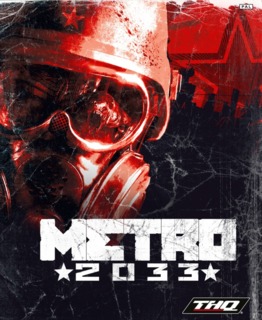Woeful gunplay and design mishaps mar what should have been a much better game.
Disappointments of this magnitude are hard to swallow.
With the tagline, "Fear the Future" there's nothing pretty about the dystopian future presented in Metro 2033, it's dark, cavernous locales permeated by must and grime and all sorts of gaseous anomalies. Based on Dmitry Glukhovsky's novel of the same name, it captures the feel of the book perfectly. This is a Russia crippled by nuclear arms. It's like a darker, more story-focused STALKER, with the same team responsible for both. But while STALKER had the hulking shell of Chernobyl to explore, here the Russian metro plays home.
You control Artyom, a boy tasked with protecting his underground home from mutants created by the nuclear fallout. Artyom is a willing protagonist, largely silent throughout the game, though he does lend his voice during load-scenes (sounding more like a chain smoking fifty-year old on these occasions than the twenty-year old boy he is). Sadly, while he's willing to do almost anyone's bidding, he also feels like a bystander. He (you) watches the events unfold, his participation more mandatory than necessary. And while you do spend stretches of the game alone, this only serves to highlight the game's most galling fault: Its gunplay.
In a day and age of Modern Warfare, I expect firefights to be honed, spruced and polished to perfection. I don't expect obvious trigger-points prompting waves of enemies, and guns that simply fail to damage the enemy at all. If the trigger-points are obvious and thinly-guised, the hit-detection is woeful. You can unload a shotgun shell from point blank range and still miss. And it's not for a lack of aiming either.
Another questionable design element is that of ammunition. Ammo comes in differing forms of quality, from A-grade military stuff to tarnished, battle-hardened bullets. The top-of-the range ammunition actually acts as a currency in the game, which forces you to make a decision: use the bullets to dispel foes quickly, or save it for better kit later. So far, so good. The problem arises from the sheer discrepancy between the A-grade ammo and everything else. Older bullets are absolutely useless. They just don't work. They don't dent the enemy, they don't kill the enemy, and you feel victorious more by luck than skill most of the time. On the other end of the spectrum, bullets of the military variety are far too effectual, which means that when you find A-grade bullets, you'll more than likely use it on the bad guys. After all, what's the good of a new gun if you're using dodgy bullets with it?
It's a case of a good idea that's been lost in translation. Or taken too far. Or severely botched. Take your pick. The stealth, too, feels strangely directionless. There's a vague nod towards Splinter Cell and Thief, in that a read-out on your suit tells you whether you're visible or not, but once an enemy sees you, the whole world sees you. Stealth really doesn't work well, and it's a shame, because it at least offers a reprieve from the horrible gun battles.
Fiighting human foes is a good deal more fun that battling the mutants, but frustratingly, the non-human monsters are the most common foe. They hulk low to the ground and pound you with melee attacks, only worsening your mood. They aren't well designed or smart, and the whole game feels shaky on the AI front.
Yes, it's a good looking game with nice effects. The view from your gas mask is very well done. Moreover, it feels authentic, replete with sounds of heavy breathing when oxygen becomes thin. But the gas mask is tied in to another issue. You're required to wear it at certain points during the game, which necessities a good supply of filters. But at one point during my adventure, I ran out of filters and subsequently died. The solution? I reloaded an hour beforehand and painstakingly collect enough filters to progress.
The fact that Metro 2033 doesn't lead you by the hand isn't always a bad thing, however. There's something to be said for a game that lets you figure out its intricacies on your own, and for this reason, it is good to replay the game a second time when you're in-tune with what works and what doesn't. All the same, you can't escape the feeling that with all these great ideas, the developers forgot to expand on them, explain them, or even figure them out for themselves. Moreover, replaying the game will only further expose you to the gunplay, which cannot be glossed over in any shape or form.
Games heralding from Eastern Europe have a tendency of being rough gems. Metro 2033 teems with potential. Its atmosphere is first-class and its story is engaging. Had Metro 2033 stuck to its strengths, focused more on human combatants and tightened the shooting, the thick, oppressive atmosphere would have been just another of the game's strengths, rather than it's main selling point.

